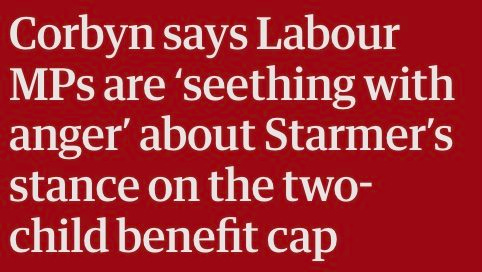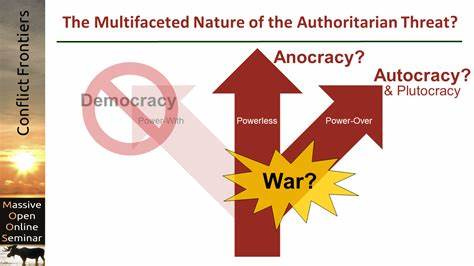Introduction
In a striking display of internal conflict, the UK Labour Party has suspended seven of its Members of Parliament for rebelling against a Conservative welfare policy that disproportionately impacts marginalised communities. This incident, centring on the controversial two-child benefit cap, lays bare the complex intersections of party politics, economic policy, and social justice in contemporary Britain. As Labour struggles with its identity under Keir Starmer's leadership, this analysis examines the broader implications of the party's rightward shift, exploring how it reflects and reinforces global trends in wealth inequality and power consolidation. Through the lens of this parliamentary rebellion, I examine the tensions between political pragmatism and core leftist values, the erosion of internal party democracy, and the wider ramifications for working-class families and Black communities in the UK. This episode serves as a microcosm of the challenges facing progressive movements worldwide, as they navigate the pressures of electability, party discipline, and the urgent need to address deepening economic and social inequalities.
Recent events have sparked controversy within the UK's Labour Party, highlighting tensions between party leadership and some of its members.
What happened?
Yesterday, seven Labour Members of Parliament (MPs) were suspended for voting against their party's position on a policy called the "two-child benefit cap." This policy, introduced by the Conservative Party in 2015, limits welfare payments to families for their first two children only.
The rebellion
The suspended MPs, including Zarah Sultana and former shadow chancellor John McDonnell, voted to support a proposal by the Scottish National Party (SNP) to end this cap. They argue that the policy contributes significantly to child poverty in the UK.
Labour leadership's stance
Labour leader Keir Starmer had previously promised to end this policy but later changed his position. The party leadership now supports keeping the two-child benefit cap, claiming there's "no silver bullet" to end child poverty.
Criticism and debate
This situation has sparked intense debate within the Labour Party and beyond:
1. Some view the suspensions as an unnecessarily harsh response to a policy disagreement.
2. Critics argue that Labour is prioritizing appearing tough over helping vulnerable families.
3. Supporters of the rebel MPs say the party is moving away from its core values of reducing poverty and supporting working-class families.
Broader implications
This conflict raises several important questions:
1. What are Labour's current priorities and values?
2. How should the party address child poverty?
3. Is Labour maintaining its connection to its traditional supporters?
The suspended MPs and their supporters argue that there are ways to fund ending the cap, such as adjusting taxes on the wealthiest. They point out that the government finds money for other priorities (like funding the war in Ukraine) when needed.
What's next?
The seven MPs have been suspended for six months, after which there will be a review. This early rebellion and the leadership's response have sent shockwaves through the party, with some members concerned about the message it sends to new MPs about party discipline.
What does it tell us about Labour under Starmer?
The suspensions are an unusually harsh response to what many consider a routine parliamentary rebellion. This move stands in stark contrast to historical norms, where such dissent was often tolerated. For instance, Boris Johnson's suspension of Brexit rebels in 2019 was widely viewed as an aberration, highlighting how unusual Starmer's actions are in the broader context of British parliamentary tradition.
Critics have not minced words, with some directly accusing Starmer's team of "petty authoritarianism". The severity of the punishment has led to speculation that it serves a dual purpose: not only to enforce party discipline but also to "give the left a kicking", effectively asserting control over a particular faction within Labour. This heavy-handed approach appears to undermine internal democracy within the party. By punishing MPs who voted according to their conscience and in line with previous party commitments the leadership is seen as stifling debate and diverse viewpoints. Zarah Sultana characterised the situation as a "macho virility test", suggesting a top-down, aggressive approach to party management. Furthermore, the suspensions seem designed to send a chilling message to new MPs about the consequences of rebellion. This tactic could be interpreted as an attempt to instil fear and ensure compliance, rather than fostering open dialogue and representation of diverse constituent interests.
Taken together, these actions paint a picture of a leadership style that prioritises strict party discipline and centralised control over allowing for a range of viewpoints within the party. This approach has led many observers to voice concerns about a shift towards more authoritarian tendencies within Labour, potentially alienating both party members and voters who value robust internal debate and democratic processes.
Black communities
The impact of the two-child benefit limit extends far beyond mere statistics, disproportionately affecting some of the most vulnerable segments of society. Notably, almost half of those affected by this policy are single parents, a fact that carries significant implications, particularly for marginalised communities.
This statistic is especially concerning when we consider the demographics of single parenthood in the UK. Black communities, for instance, have historically had higher rates of single-parent households compared to the national average. According to the Office for National Statistics, 63% of Black Caribbean children and 62% of Black African children live in single-parent families, compared to an overall average of 22% across all ethnic groups.
The intersection of race and family structure in this context paints a troubling picture. The two-child benefit cap, by disproportionately impacting single parents, may be inadvertently amplifying existing racial disparities in economic well-being. Black single parents, already facing systemic barriers and racial inequalities in areas such as employment, housing, and education, may find themselves particularly vulnerable to the financial strain imposed by this policy.
Moreover, this situation risks perpetuating cycles of poverty within Black communities. Children raised in financially stressed households are more likely to experience adverse outcomes in education, health, and future economic prospects. By limiting support for larger families, the policy could be entrenching intergenerational poverty, making it even more challenging for affected Black families to overcome existing socioeconomic barriers.
The Labour Party's current stance on maintaining the two-child benefit cap, therefore, raises serious questions about its commitment to addressing racial and economic inequalities. As the party traditionally seen as a champion for working-class and minority communities, Labour's position on this issue seems at odds with its historical values and the needs of some of its core constituents.
This situation underscores the complex interplay between policy decisions, family structures, and racial dynamics in shaping economic outcomes. It highlights the need for nuanced, intersectional approaches to welfare policy that consider the diverse realities of modern British families, particularly those from marginalised communities. As the debate over the two-child benefit cap continues, it's crucial to centre the voices and experiences of those most affected, including single parents and Black families, in shaping a more equitable and inclusive social support system.
Global Tendency
The authoritarian tendencies observed within the UK Labour Party can be viewed as part of a broader global shift towards more conservative and authoritarian governance styles. This trend is evident in various countries, with Hungary and the United States under Donald Trump being particularly stark examples. In Hungary, Viktor Orbán's government has steadily eroded democratic norms, centralised power and limited press freedoms. Similarly, Donald Trump's presidency in the USA was marked by attempts to undermine democratic institutions, attacks on the media, and a populist rhetoric that often-disregarded established political norms.
The Labour Party's recent actions, while not as extreme, echo some of these tendencies. The harsh punishment of dissenters and the centralisation of power within the party leadership mirror, albeit on a smaller scale, the tactics used by more authoritarian regimes to maintain control. This rightward shift often manifests as a tightening of party discipline, a focus on 'strong' leadership, and a willingness to sacrifice internal democracy for the sake of presenting a unified front. In Labour's case, the suspension of MPs who voted against the two-child benefit cap policy demonstrates a prioritisation of party unity over individual conscience or representation of diverse constituent interests. Moreover, the Labour leadership's stance on the two-child benefit cap itself can be seen as part of a broader trend of centre-left parties adopting traditionally right-wing positions on welfare and social issues. This 'triangulation' strategy, aimed at appealing to a wider electorate, often results in these parties moving away from their traditional left-wing base.
The global context of this shift is complex, often driven by factors such as economic uncertainty, cultural anxieties, and a backlash against globalisation. In many countries, this has led to the rise of populist leaders who promise strong, decisive leadership - often at the expense of democratic norms and institutions. While the UK Labour Party's actions are not as extreme as those seen in Hungary or Trump's USA, they do reflect a similar impulse towards centralised control and party discipline. This trend raises concerns about the health of internal party democracy and, by extension, the robustness of democratic processes in the broader political system.
Conclusion
The Labour Party's stance on the two-child benefit cap, coupled with its harsh treatment of dissenting voices, paints a deeply troubling picture of the UK's political landscape. As we witness the rightward shift of a party once championed as the voice of the working class and marginalised communities, we cannot help but feel a profound sense of unease. This trend, mirroring global patterns of increasing authoritarianism and conservative governance, threatens to erode the very foundations of progressive politics. The disproportionate impact on single parents and Black communities further exacerbates existing inequalities, potentially entrenching cycles of poverty for generations to come. As we look to the future, we are left with a gnawing anxiety: if even the Labour Party is willing to sacrifice its core values and suppress internal democracy in pursuit of electoral success, who will stand up for the most vulnerable in our society? The road ahead appears fraught with challenges, and the fight for a more equitable and just society seems more urgent—and perhaps more difficult—than ever before.
However, it's important to note, that this rightward shift is not uniform or unopposed (France provides one notable exception). The rebellion of the seven Labour MPs, and the subsequent public debate, demonstrate that there remain strong voices advocating for more progressive policies and democratic party structures. The tension between these competing visions for the party - and for governance more broadly - is likely to continue shaping political discourse in the UK and around the world for some time to come.




